Legal Analysis: Denver's Private Nuisance Claim Against Ron's Pig Farm
VerifiedAdded on 2022/08/19
|8
|1940
|17
Case Study
AI Summary
This case study examines a legal dispute between Denver, an organic vegan farmer, and Ron, a pig farmer, focusing on the concept of private nuisance. Denver's business is negatively impacted by the smell from Ron's pig roasts, which offends his vegan customers. The core legal issue revolves around whether Ron's activities constitute a private nuisance, interfering with Denver's enjoyment of his property. The analysis explores the elements of private nuisance, including interference with property enjoyment, substantial interference, and unreasonableness. The case considers the application of the Farm Practices Protection (Right to Farm) Act, which provides immunity to farmers. The conclusion is that Ron's actions do not constitute a private nuisance due to the right to farm act. The document also includes recommendations for potential resolutions, such as amicable settlements and suggested adjustments to business operations. The document includes citations from legal journals and websites.
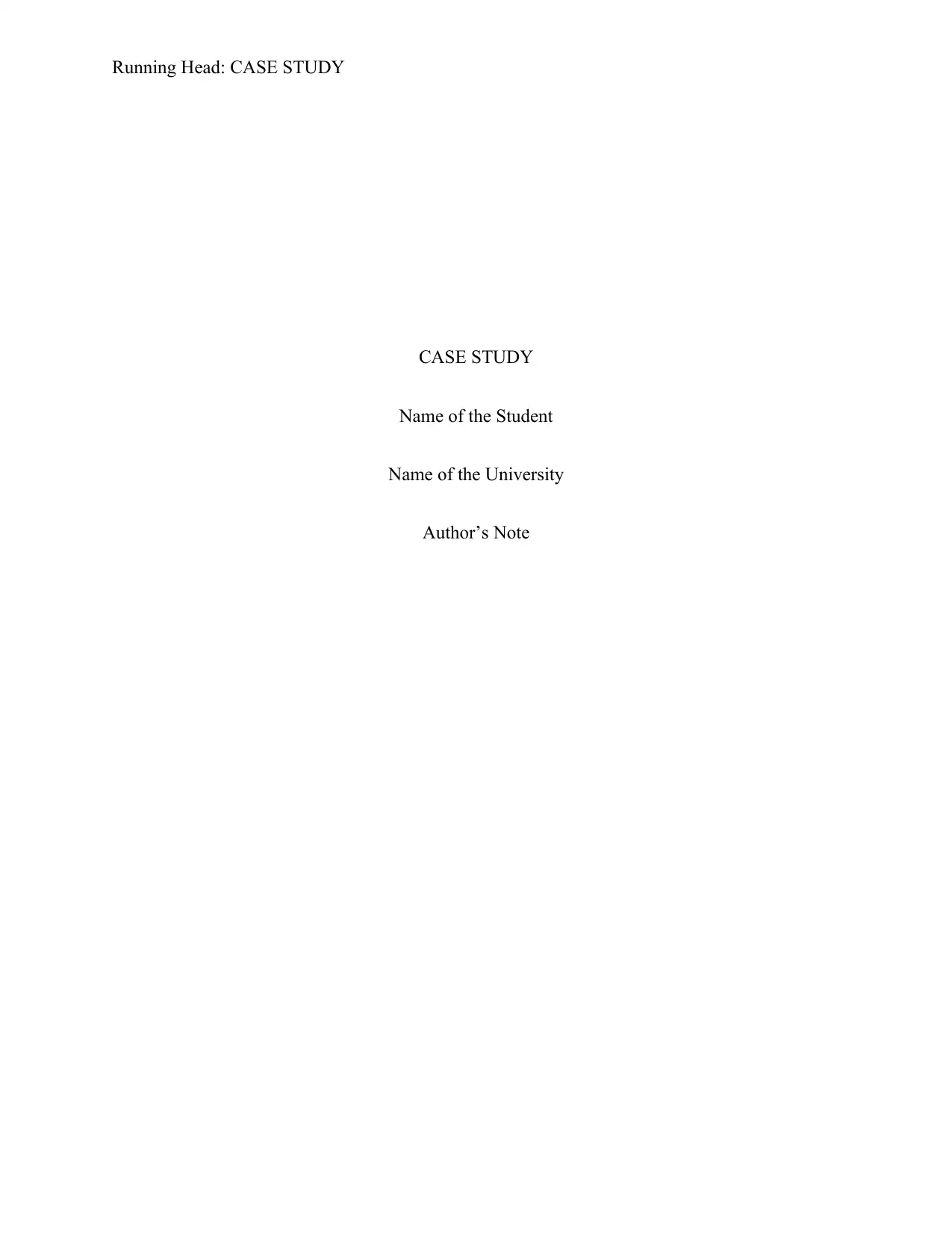
Running Head: CASE STUDY
CASE STUDY
Name of the Student
Name of the University
Author’s Note
CASE STUDY
Name of the Student
Name of the University
Author’s Note
Paraphrase This Document
Need a fresh take? Get an instant paraphrase of this document with our AI Paraphraser
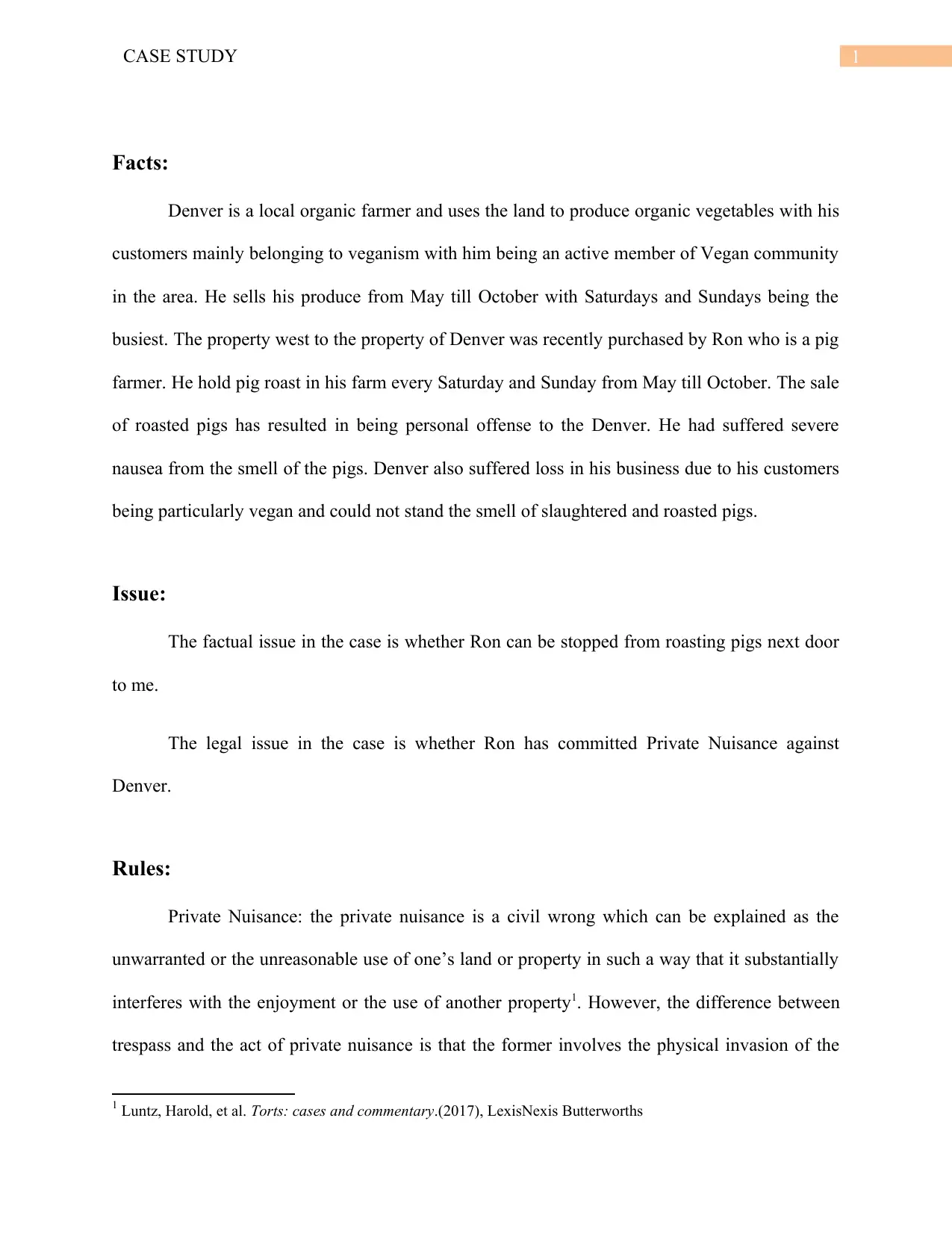
1CASE STUDY
Facts:
Denver is a local organic farmer and uses the land to produce organic vegetables with his
customers mainly belonging to veganism with him being an active member of Vegan community
in the area. He sells his produce from May till October with Saturdays and Sundays being the
busiest. The property west to the property of Denver was recently purchased by Ron who is a pig
farmer. He hold pig roast in his farm every Saturday and Sunday from May till October. The sale
of roasted pigs has resulted in being personal offense to the Denver. He had suffered severe
nausea from the smell of the pigs. Denver also suffered loss in his business due to his customers
being particularly vegan and could not stand the smell of slaughtered and roasted pigs.
Issue:
The factual issue in the case is whether Ron can be stopped from roasting pigs next door
to me.
The legal issue in the case is whether Ron has committed Private Nuisance against
Denver.
Rules:
Private Nuisance: the private nuisance is a civil wrong which can be explained as the
unwarranted or the unreasonable use of one’s land or property in such a way that it substantially
interferes with the enjoyment or the use of another property1. However, the difference between
trespass and the act of private nuisance is that the former involves the physical invasion of the
1 Luntz, Harold, et al. Torts: cases and commentary.(2017), LexisNexis Butterworths
Facts:
Denver is a local organic farmer and uses the land to produce organic vegetables with his
customers mainly belonging to veganism with him being an active member of Vegan community
in the area. He sells his produce from May till October with Saturdays and Sundays being the
busiest. The property west to the property of Denver was recently purchased by Ron who is a pig
farmer. He hold pig roast in his farm every Saturday and Sunday from May till October. The sale
of roasted pigs has resulted in being personal offense to the Denver. He had suffered severe
nausea from the smell of the pigs. Denver also suffered loss in his business due to his customers
being particularly vegan and could not stand the smell of slaughtered and roasted pigs.
Issue:
The factual issue in the case is whether Ron can be stopped from roasting pigs next door
to me.
The legal issue in the case is whether Ron has committed Private Nuisance against
Denver.
Rules:
Private Nuisance: the private nuisance is a civil wrong which can be explained as the
unwarranted or the unreasonable use of one’s land or property in such a way that it substantially
interferes with the enjoyment or the use of another property1. However, the difference between
trespass and the act of private nuisance is that the former involves the physical invasion of the
1 Luntz, Harold, et al. Torts: cases and commentary.(2017), LexisNexis Butterworths
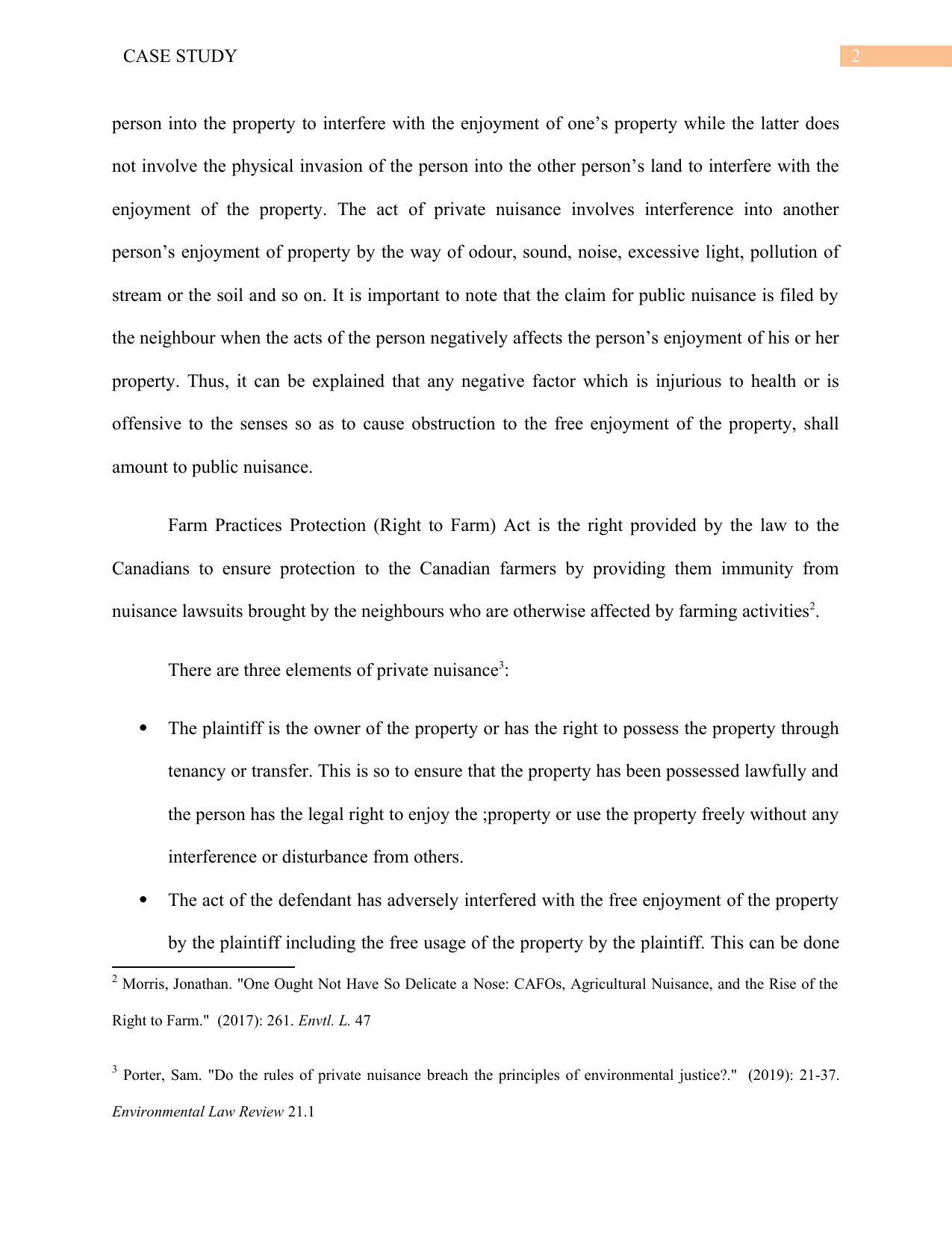
2CASE STUDY
person into the property to interfere with the enjoyment of one’s property while the latter does
not involve the physical invasion of the person into the other person’s land to interfere with the
enjoyment of the property. The act of private nuisance involves interference into another
person’s enjoyment of property by the way of odour, sound, noise, excessive light, pollution of
stream or the soil and so on. It is important to note that the claim for public nuisance is filed by
the neighbour when the acts of the person negatively affects the person’s enjoyment of his or her
property. Thus, it can be explained that any negative factor which is injurious to health or is
offensive to the senses so as to cause obstruction to the free enjoyment of the property, shall
amount to public nuisance.
Farm Practices Protection (Right to Farm) Act is the right provided by the law to the
Canadians to ensure protection to the Canadian farmers by providing them immunity from
nuisance lawsuits brought by the neighbours who are otherwise affected by farming activities2.
There are three elements of private nuisance3:
The plaintiff is the owner of the property or has the right to possess the property through
tenancy or transfer. This is so to ensure that the property has been possessed lawfully and
the person has the legal right to enjoy the ;property or use the property freely without any
interference or disturbance from others.
The act of the defendant has adversely interfered with the free enjoyment of the property
by the plaintiff including the free usage of the property by the plaintiff. This can be done
2 Morris, Jonathan. "One Ought Not Have So Delicate a Nose: CAFOs, Agricultural Nuisance, and the Rise of the
Right to Farm." (2017): 261. Envtl. L. 47
3 Porter, Sam. "Do the rules of private nuisance breach the principles of environmental justice?." (2019): 21-37.
Environmental Law Review 21.1
person into the property to interfere with the enjoyment of one’s property while the latter does
not involve the physical invasion of the person into the other person’s land to interfere with the
enjoyment of the property. The act of private nuisance involves interference into another
person’s enjoyment of property by the way of odour, sound, noise, excessive light, pollution of
stream or the soil and so on. It is important to note that the claim for public nuisance is filed by
the neighbour when the acts of the person negatively affects the person’s enjoyment of his or her
property. Thus, it can be explained that any negative factor which is injurious to health or is
offensive to the senses so as to cause obstruction to the free enjoyment of the property, shall
amount to public nuisance.
Farm Practices Protection (Right to Farm) Act is the right provided by the law to the
Canadians to ensure protection to the Canadian farmers by providing them immunity from
nuisance lawsuits brought by the neighbours who are otherwise affected by farming activities2.
There are three elements of private nuisance3:
The plaintiff is the owner of the property or has the right to possess the property through
tenancy or transfer. This is so to ensure that the property has been possessed lawfully and
the person has the legal right to enjoy the ;property or use the property freely without any
interference or disturbance from others.
The act of the defendant has adversely interfered with the free enjoyment of the property
by the plaintiff including the free usage of the property by the plaintiff. This can be done
2 Morris, Jonathan. "One Ought Not Have So Delicate a Nose: CAFOs, Agricultural Nuisance, and the Rise of the
Right to Farm." (2017): 261. Envtl. L. 47
3 Porter, Sam. "Do the rules of private nuisance breach the principles of environmental justice?." (2019): 21-37.
Environmental Law Review 21.1
⊘ This is a preview!⊘
Do you want full access?
Subscribe today to unlock all pages.

Trusted by 1+ million students worldwide
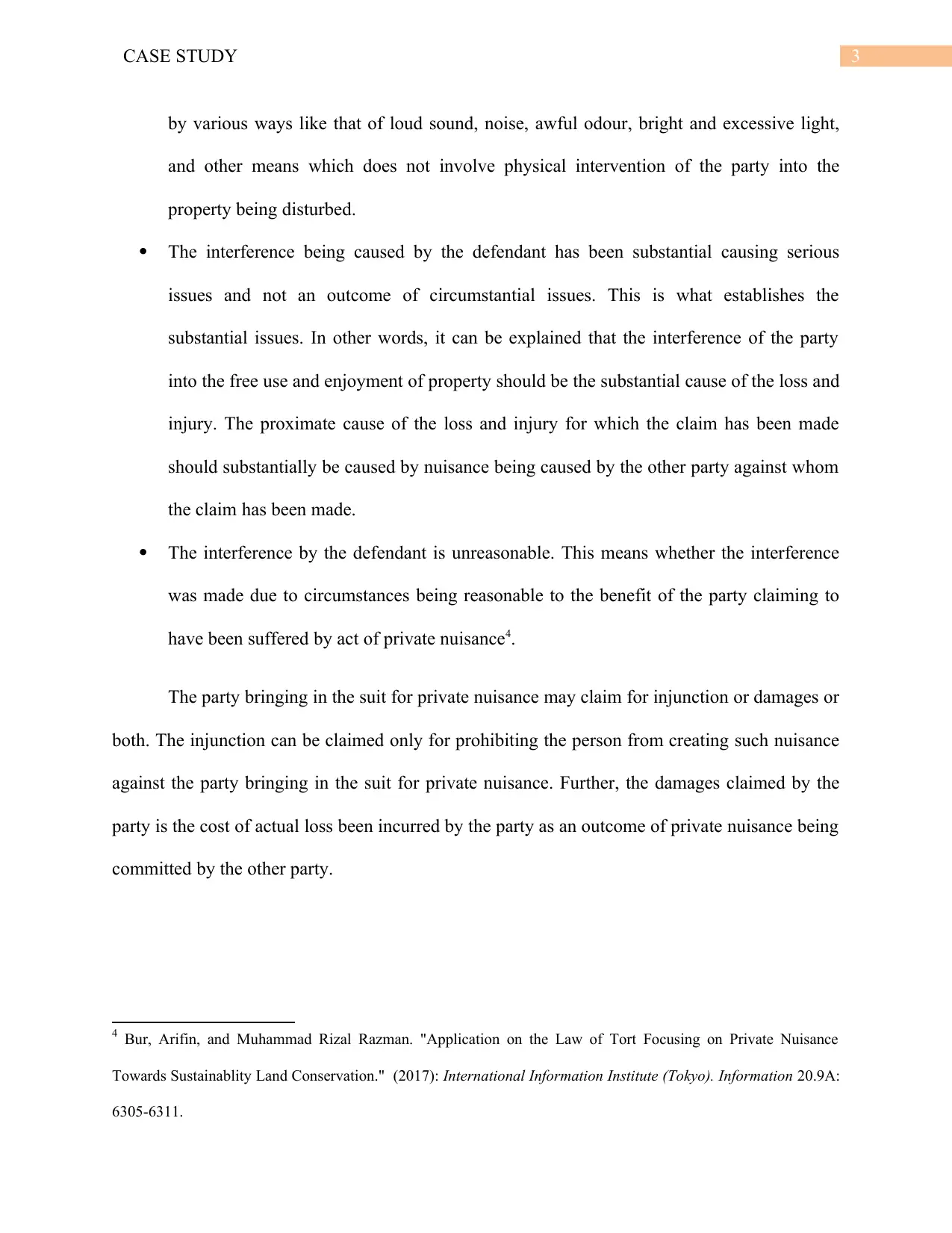
3CASE STUDY
by various ways like that of loud sound, noise, awful odour, bright and excessive light,
and other means which does not involve physical intervention of the party into the
property being disturbed.
The interference being caused by the defendant has been substantial causing serious
issues and not an outcome of circumstantial issues. This is what establishes the
substantial issues. In other words, it can be explained that the interference of the party
into the free use and enjoyment of property should be the substantial cause of the loss and
injury. The proximate cause of the loss and injury for which the claim has been made
should substantially be caused by nuisance being caused by the other party against whom
the claim has been made.
The interference by the defendant is unreasonable. This means whether the interference
was made due to circumstances being reasonable to the benefit of the party claiming to
have been suffered by act of private nuisance4.
The party bringing in the suit for private nuisance may claim for injunction or damages or
both. The injunction can be claimed only for prohibiting the person from creating such nuisance
against the party bringing in the suit for private nuisance. Further, the damages claimed by the
party is the cost of actual loss been incurred by the party as an outcome of private nuisance being
committed by the other party.
4 Bur, Arifin, and Muhammad Rizal Razman. "Application on the Law of Tort Focusing on Private Nuisance
Towards Sustainablity Land Conservation." (2017): International Information Institute (Tokyo). Information 20.9A:
6305-6311.
by various ways like that of loud sound, noise, awful odour, bright and excessive light,
and other means which does not involve physical intervention of the party into the
property being disturbed.
The interference being caused by the defendant has been substantial causing serious
issues and not an outcome of circumstantial issues. This is what establishes the
substantial issues. In other words, it can be explained that the interference of the party
into the free use and enjoyment of property should be the substantial cause of the loss and
injury. The proximate cause of the loss and injury for which the claim has been made
should substantially be caused by nuisance being caused by the other party against whom
the claim has been made.
The interference by the defendant is unreasonable. This means whether the interference
was made due to circumstances being reasonable to the benefit of the party claiming to
have been suffered by act of private nuisance4.
The party bringing in the suit for private nuisance may claim for injunction or damages or
both. The injunction can be claimed only for prohibiting the person from creating such nuisance
against the party bringing in the suit for private nuisance. Further, the damages claimed by the
party is the cost of actual loss been incurred by the party as an outcome of private nuisance being
committed by the other party.
4 Bur, Arifin, and Muhammad Rizal Razman. "Application on the Law of Tort Focusing on Private Nuisance
Towards Sustainablity Land Conservation." (2017): International Information Institute (Tokyo). Information 20.9A:
6305-6311.
Paraphrase This Document
Need a fresh take? Get an instant paraphrase of this document with our AI Paraphraser
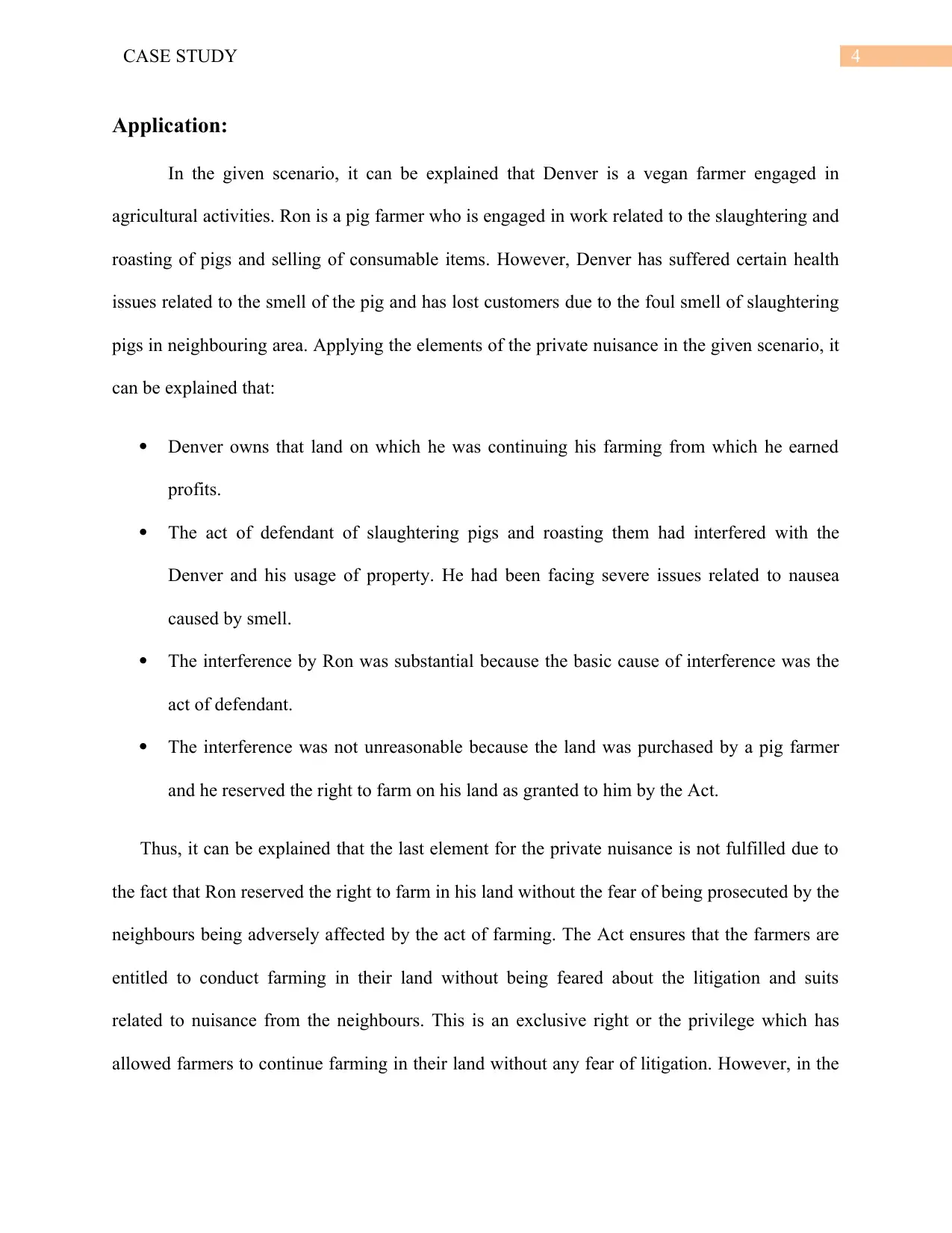
4CASE STUDY
Application:
In the given scenario, it can be explained that Denver is a vegan farmer engaged in
agricultural activities. Ron is a pig farmer who is engaged in work related to the slaughtering and
roasting of pigs and selling of consumable items. However, Denver has suffered certain health
issues related to the smell of the pig and has lost customers due to the foul smell of slaughtering
pigs in neighbouring area. Applying the elements of the private nuisance in the given scenario, it
can be explained that:
Denver owns that land on which he was continuing his farming from which he earned
profits.
The act of defendant of slaughtering pigs and roasting them had interfered with the
Denver and his usage of property. He had been facing severe issues related to nausea
caused by smell.
The interference by Ron was substantial because the basic cause of interference was the
act of defendant.
The interference was not unreasonable because the land was purchased by a pig farmer
and he reserved the right to farm on his land as granted to him by the Act.
Thus, it can be explained that the last element for the private nuisance is not fulfilled due to
the fact that Ron reserved the right to farm in his land without the fear of being prosecuted by the
neighbours being adversely affected by the act of farming. The Act ensures that the farmers are
entitled to conduct farming in their land without being feared about the litigation and suits
related to nuisance from the neighbours. This is an exclusive right or the privilege which has
allowed farmers to continue farming in their land without any fear of litigation. However, in the
Application:
In the given scenario, it can be explained that Denver is a vegan farmer engaged in
agricultural activities. Ron is a pig farmer who is engaged in work related to the slaughtering and
roasting of pigs and selling of consumable items. However, Denver has suffered certain health
issues related to the smell of the pig and has lost customers due to the foul smell of slaughtering
pigs in neighbouring area. Applying the elements of the private nuisance in the given scenario, it
can be explained that:
Denver owns that land on which he was continuing his farming from which he earned
profits.
The act of defendant of slaughtering pigs and roasting them had interfered with the
Denver and his usage of property. He had been facing severe issues related to nausea
caused by smell.
The interference by Ron was substantial because the basic cause of interference was the
act of defendant.
The interference was not unreasonable because the land was purchased by a pig farmer
and he reserved the right to farm on his land as granted to him by the Act.
Thus, it can be explained that the last element for the private nuisance is not fulfilled due to
the fact that Ron reserved the right to farm in his land without the fear of being prosecuted by the
neighbours being adversely affected by the act of farming. The Act ensures that the farmers are
entitled to conduct farming in their land without being feared about the litigation and suits
related to nuisance from the neighbours. This is an exclusive right or the privilege which has
allowed farmers to continue farming in their land without any fear of litigation. However, in the
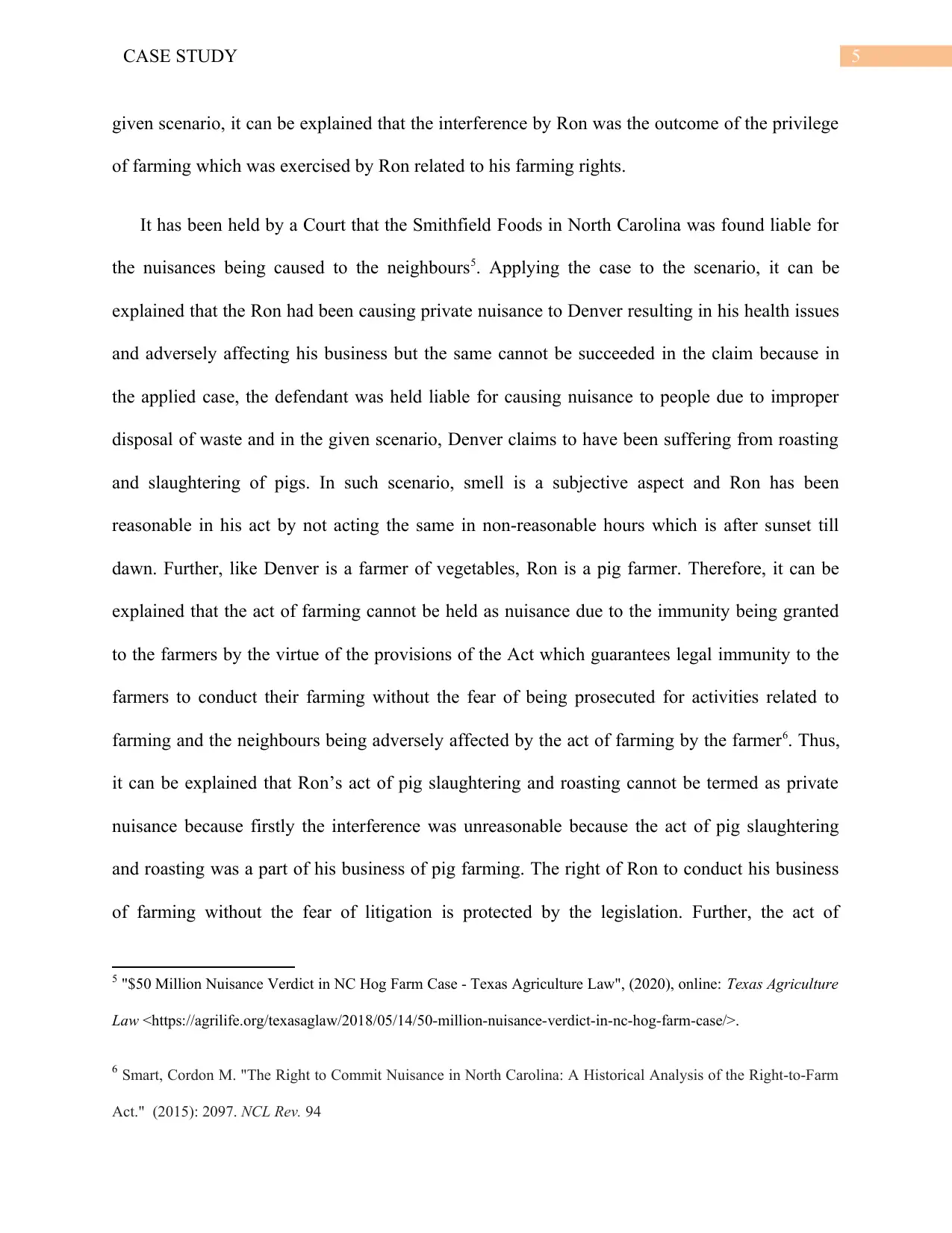
5CASE STUDY
given scenario, it can be explained that the interference by Ron was the outcome of the privilege
of farming which was exercised by Ron related to his farming rights.
It has been held by a Court that the Smithfield Foods in North Carolina was found liable for
the nuisances being caused to the neighbours5. Applying the case to the scenario, it can be
explained that the Ron had been causing private nuisance to Denver resulting in his health issues
and adversely affecting his business but the same cannot be succeeded in the claim because in
the applied case, the defendant was held liable for causing nuisance to people due to improper
disposal of waste and in the given scenario, Denver claims to have been suffering from roasting
and slaughtering of pigs. In such scenario, smell is a subjective aspect and Ron has been
reasonable in his act by not acting the same in non-reasonable hours which is after sunset till
dawn. Further, like Denver is a farmer of vegetables, Ron is a pig farmer. Therefore, it can be
explained that the act of farming cannot be held as nuisance due to the immunity being granted
to the farmers by the virtue of the provisions of the Act which guarantees legal immunity to the
farmers to conduct their farming without the fear of being prosecuted for activities related to
farming and the neighbours being adversely affected by the act of farming by the farmer6. Thus,
it can be explained that Ron’s act of pig slaughtering and roasting cannot be termed as private
nuisance because firstly the interference was unreasonable because the act of pig slaughtering
and roasting was a part of his business of pig farming. The right of Ron to conduct his business
of farming without the fear of litigation is protected by the legislation. Further, the act of
5 "$50 Million Nuisance Verdict in NC Hog Farm Case - Texas Agriculture Law", (2020), online: Texas Agriculture
Law <https://agrilife.org/texasaglaw/2018/05/14/50-million-nuisance-verdict-in-nc-hog-farm-case/>.
6 Smart, Cordon M. "The Right to Commit Nuisance in North Carolina: A Historical Analysis of the Right-to-Farm
Act." (2015): 2097. NCL Rev. 94
given scenario, it can be explained that the interference by Ron was the outcome of the privilege
of farming which was exercised by Ron related to his farming rights.
It has been held by a Court that the Smithfield Foods in North Carolina was found liable for
the nuisances being caused to the neighbours5. Applying the case to the scenario, it can be
explained that the Ron had been causing private nuisance to Denver resulting in his health issues
and adversely affecting his business but the same cannot be succeeded in the claim because in
the applied case, the defendant was held liable for causing nuisance to people due to improper
disposal of waste and in the given scenario, Denver claims to have been suffering from roasting
and slaughtering of pigs. In such scenario, smell is a subjective aspect and Ron has been
reasonable in his act by not acting the same in non-reasonable hours which is after sunset till
dawn. Further, like Denver is a farmer of vegetables, Ron is a pig farmer. Therefore, it can be
explained that the act of farming cannot be held as nuisance due to the immunity being granted
to the farmers by the virtue of the provisions of the Act which guarantees legal immunity to the
farmers to conduct their farming without the fear of being prosecuted for activities related to
farming and the neighbours being adversely affected by the act of farming by the farmer6. Thus,
it can be explained that Ron’s act of pig slaughtering and roasting cannot be termed as private
nuisance because firstly the interference was unreasonable because the act of pig slaughtering
and roasting was a part of his business of pig farming. The right of Ron to conduct his business
of farming without the fear of litigation is protected by the legislation. Further, the act of
5 "$50 Million Nuisance Verdict in NC Hog Farm Case - Texas Agriculture Law", (2020), online: Texas Agriculture
Law <https://agrilife.org/texasaglaw/2018/05/14/50-million-nuisance-verdict-in-nc-hog-farm-case/>.
6 Smart, Cordon M. "The Right to Commit Nuisance in North Carolina: A Historical Analysis of the Right-to-Farm
Act." (2015): 2097. NCL Rev. 94
⊘ This is a preview!⊘
Do you want full access?
Subscribe today to unlock all pages.

Trusted by 1+ million students worldwide
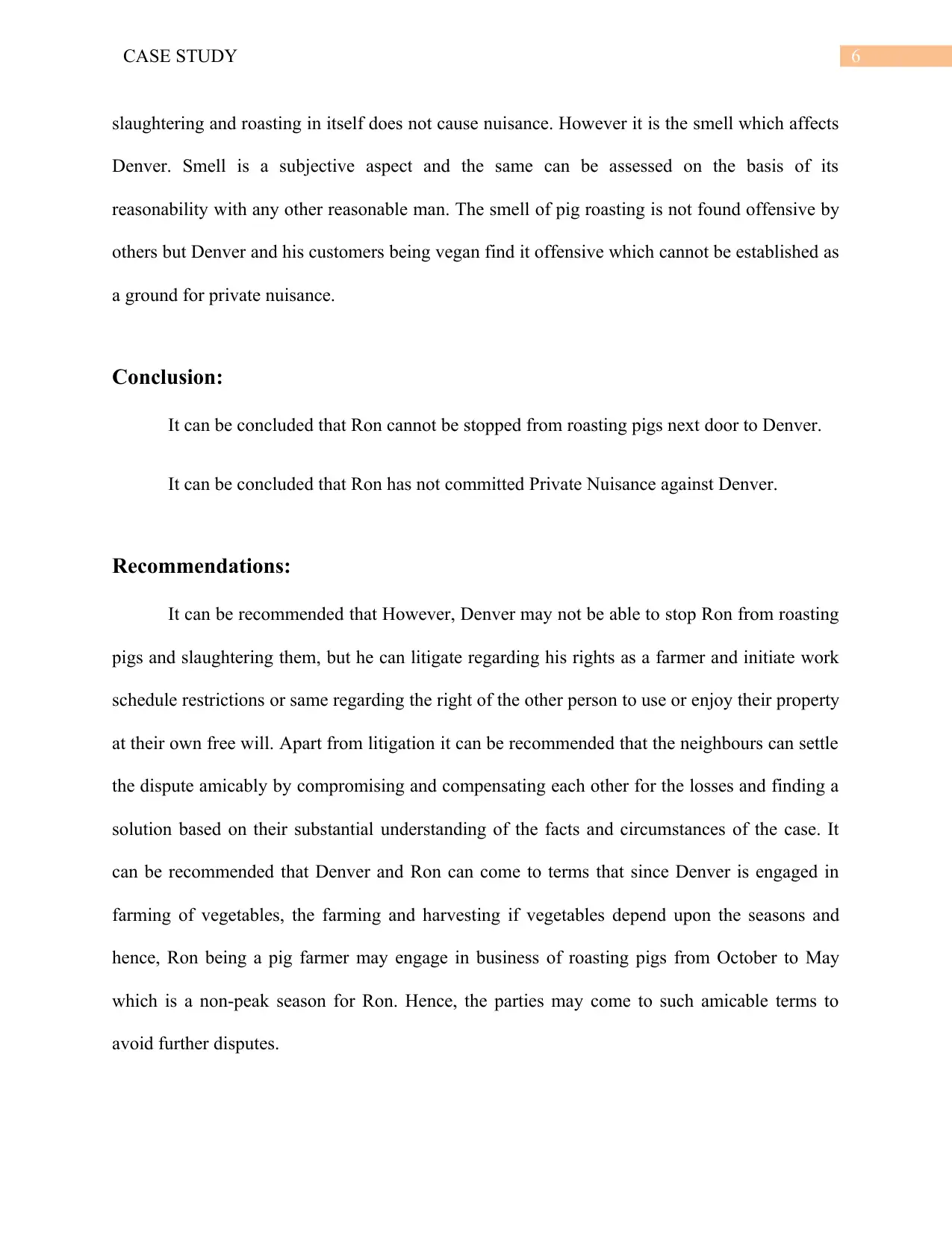
6CASE STUDY
slaughtering and roasting in itself does not cause nuisance. However it is the smell which affects
Denver. Smell is a subjective aspect and the same can be assessed on the basis of its
reasonability with any other reasonable man. The smell of pig roasting is not found offensive by
others but Denver and his customers being vegan find it offensive which cannot be established as
a ground for private nuisance.
Conclusion:
It can be concluded that Ron cannot be stopped from roasting pigs next door to Denver.
It can be concluded that Ron has not committed Private Nuisance against Denver.
Recommendations:
It can be recommended that However, Denver may not be able to stop Ron from roasting
pigs and slaughtering them, but he can litigate regarding his rights as a farmer and initiate work
schedule restrictions or same regarding the right of the other person to use or enjoy their property
at their own free will. Apart from litigation it can be recommended that the neighbours can settle
the dispute amicably by compromising and compensating each other for the losses and finding a
solution based on their substantial understanding of the facts and circumstances of the case. It
can be recommended that Denver and Ron can come to terms that since Denver is engaged in
farming of vegetables, the farming and harvesting if vegetables depend upon the seasons and
hence, Ron being a pig farmer may engage in business of roasting pigs from October to May
which is a non-peak season for Ron. Hence, the parties may come to such amicable terms to
avoid further disputes.
slaughtering and roasting in itself does not cause nuisance. However it is the smell which affects
Denver. Smell is a subjective aspect and the same can be assessed on the basis of its
reasonability with any other reasonable man. The smell of pig roasting is not found offensive by
others but Denver and his customers being vegan find it offensive which cannot be established as
a ground for private nuisance.
Conclusion:
It can be concluded that Ron cannot be stopped from roasting pigs next door to Denver.
It can be concluded that Ron has not committed Private Nuisance against Denver.
Recommendations:
It can be recommended that However, Denver may not be able to stop Ron from roasting
pigs and slaughtering them, but he can litigate regarding his rights as a farmer and initiate work
schedule restrictions or same regarding the right of the other person to use or enjoy their property
at their own free will. Apart from litigation it can be recommended that the neighbours can settle
the dispute amicably by compromising and compensating each other for the losses and finding a
solution based on their substantial understanding of the facts and circumstances of the case. It
can be recommended that Denver and Ron can come to terms that since Denver is engaged in
farming of vegetables, the farming and harvesting if vegetables depend upon the seasons and
hence, Ron being a pig farmer may engage in business of roasting pigs from October to May
which is a non-peak season for Ron. Hence, the parties may come to such amicable terms to
avoid further disputes.
Paraphrase This Document
Need a fresh take? Get an instant paraphrase of this document with our AI Paraphraser
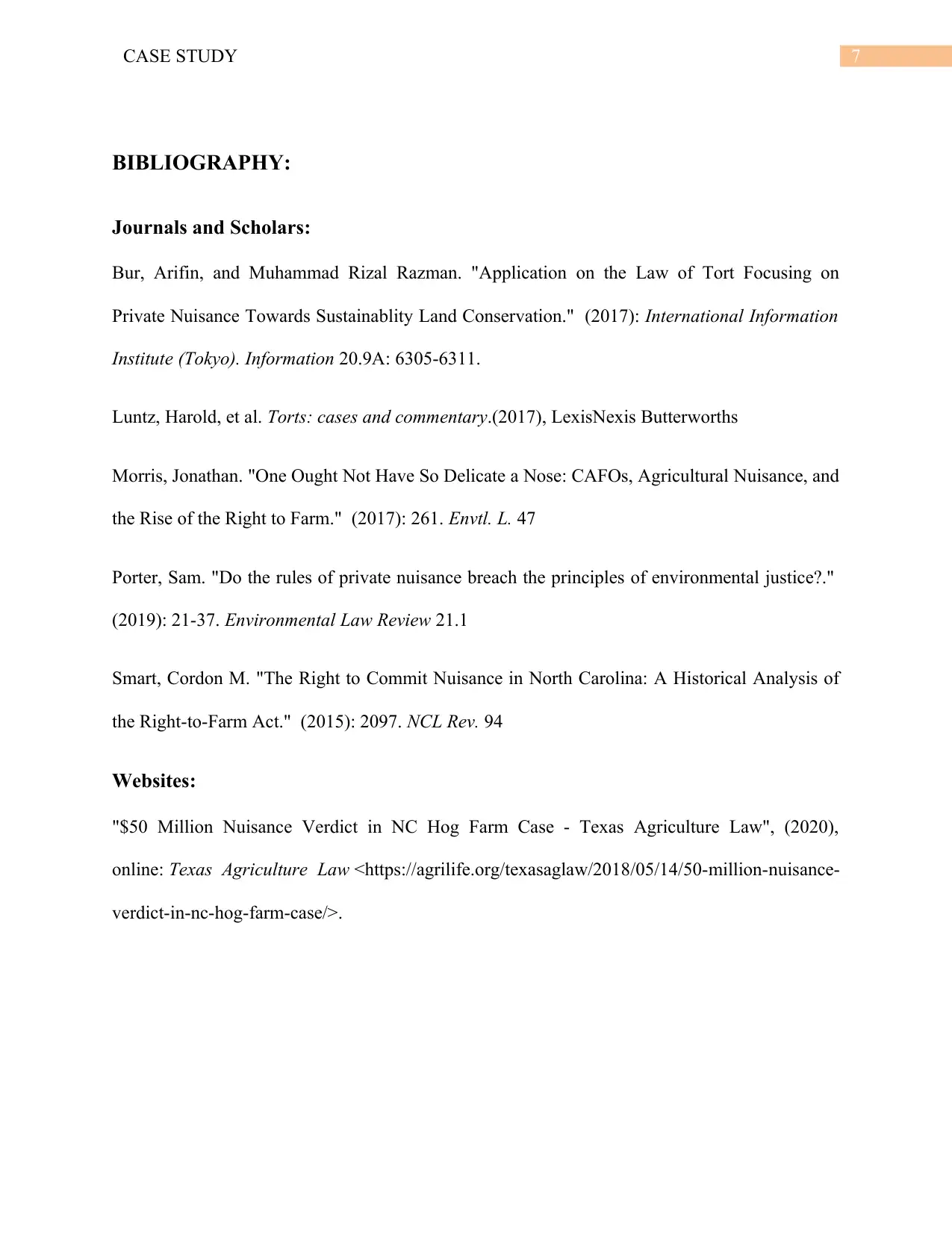
7CASE STUDY
BIBLIOGRAPHY:
Journals and Scholars:
Bur, Arifin, and Muhammad Rizal Razman. "Application on the Law of Tort Focusing on
Private Nuisance Towards Sustainablity Land Conservation." (2017): International Information
Institute (Tokyo). Information 20.9A: 6305-6311.
Luntz, Harold, et al. Torts: cases and commentary.(2017), LexisNexis Butterworths
Morris, Jonathan. "One Ought Not Have So Delicate a Nose: CAFOs, Agricultural Nuisance, and
the Rise of the Right to Farm." (2017): 261. Envtl. L. 47
Porter, Sam. "Do the rules of private nuisance breach the principles of environmental justice?."
(2019): 21-37. Environmental Law Review 21.1
Smart, Cordon M. "The Right to Commit Nuisance in North Carolina: A Historical Analysis of
the Right-to-Farm Act." (2015): 2097. NCL Rev. 94
Websites:
"$50 Million Nuisance Verdict in NC Hog Farm Case - Texas Agriculture Law", (2020),
online: Texas Agriculture Law <https://agrilife.org/texasaglaw/2018/05/14/50-million-nuisance-
verdict-in-nc-hog-farm-case/>.
BIBLIOGRAPHY:
Journals and Scholars:
Bur, Arifin, and Muhammad Rizal Razman. "Application on the Law of Tort Focusing on
Private Nuisance Towards Sustainablity Land Conservation." (2017): International Information
Institute (Tokyo). Information 20.9A: 6305-6311.
Luntz, Harold, et al. Torts: cases and commentary.(2017), LexisNexis Butterworths
Morris, Jonathan. "One Ought Not Have So Delicate a Nose: CAFOs, Agricultural Nuisance, and
the Rise of the Right to Farm." (2017): 261. Envtl. L. 47
Porter, Sam. "Do the rules of private nuisance breach the principles of environmental justice?."
(2019): 21-37. Environmental Law Review 21.1
Smart, Cordon M. "The Right to Commit Nuisance in North Carolina: A Historical Analysis of
the Right-to-Farm Act." (2015): 2097. NCL Rev. 94
Websites:
"$50 Million Nuisance Verdict in NC Hog Farm Case - Texas Agriculture Law", (2020),
online: Texas Agriculture Law <https://agrilife.org/texasaglaw/2018/05/14/50-million-nuisance-
verdict-in-nc-hog-farm-case/>.
1 out of 8
Your All-in-One AI-Powered Toolkit for Academic Success.
+13062052269
info@desklib.com
Available 24*7 on WhatsApp / Email
![[object Object]](/_next/static/media/star-bottom.7253800d.svg)
Unlock your academic potential
Copyright © 2020–2026 A2Z Services. All Rights Reserved. Developed and managed by ZUCOL.

